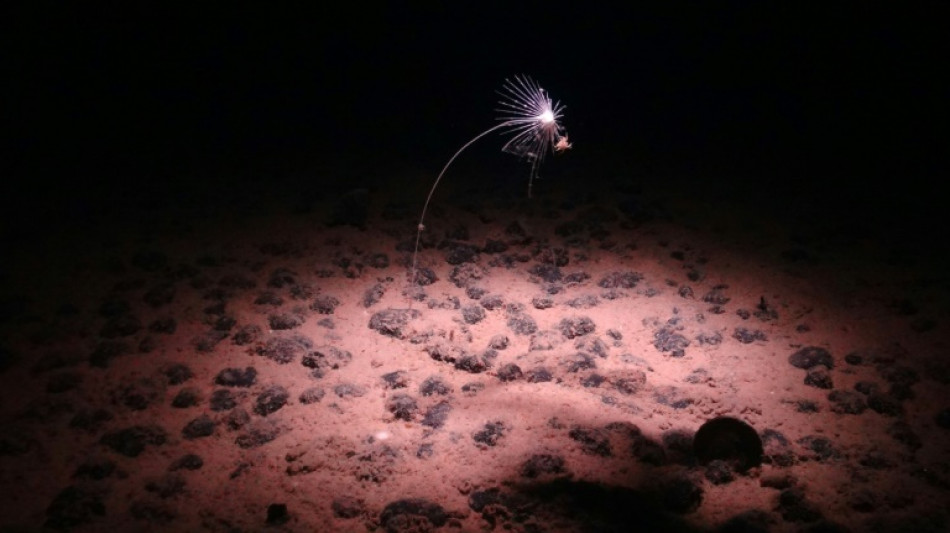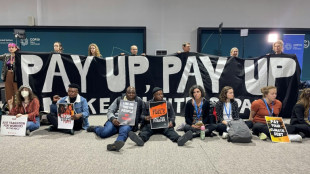
-
 Stocks diverge on fears of Ukraine-Russia escalation
Stocks diverge on fears of Ukraine-Russia escalation
-
New Botswana leader eyes cannabis, sunshine to lift economy

-
 'Operation Night Watch': Rembrandt classic gets makeover
'Operation Night Watch': Rembrandt classic gets makeover
-
Haiti police, civilians kill 28 gang members: authorities

-
 Taxing the richest: what the G20 decided
Taxing the richest: what the G20 decided
-
'Minecraft' to come to life in UK and US under theme park deal

-
 IMF, Ukraine, reach agreement on $1.1 bn loan disbursement
IMF, Ukraine, reach agreement on $1.1 bn loan disbursement
-
Japan on cusp of World Cup as Son scores in Palestine draw

-
 Chelsea condemn 'hateful' homophobic abuse towards Kerr, Mewis
Chelsea condemn 'hateful' homophobic abuse towards Kerr, Mewis
-
Hamilton to race final three grands prix of Mercedes career

-
 Gatland has not become a 'bad coach' says Springboks' Erasmus
Gatland has not become a 'bad coach' says Springboks' Erasmus
-
Slovakia take Britain to doubles decider in BJK Cup semis

-
 Brazil arrests soldiers over alleged 2022 Lula assassination plot
Brazil arrests soldiers over alleged 2022 Lula assassination plot
-
Ukraine war and climate stalemate loom over G20 summit

-
 Ukraine fires first US long-range missiles into Russia
Ukraine fires first US long-range missiles into Russia
-
Retiring Nadal to play singles for Spain against Netherlands in Davis Cup

-
 Rain ruins Sri Lanka's final ODI against New Zealand
Rain ruins Sri Lanka's final ODI against New Zealand
-
Stocks sink on fears of Ukraine-Russia escalation

-
 Hendrikse brothers start for South Africa against Wales
Hendrikse brothers start for South Africa against Wales
-
Macron tells Xi he shares desire for 'durable peace' in Ukraine

-
 Ruthless Japan beat China to move to brink of World Cup qualification
Ruthless Japan beat China to move to brink of World Cup qualification
-
French farmers threaten 'chaos' over proposed EU-Mercosur deal

-
 Brazil arrests G20 guards over alleged 2022 Lula assassination plot
Brazil arrests G20 guards over alleged 2022 Lula assassination plot
-
China's Xi urges 'strategic' ties in talks with Germany's Scholz

-
 Raducanu gives Britain lead on Slovakia in BJK Cup semis
Raducanu gives Britain lead on Slovakia in BJK Cup semis
-
Russia says Ukraine fired first US-long range missiles

-
 COP29 negotiators strive for deal after G20 'marching orders'
COP29 negotiators strive for deal after G20 'marching orders'
-
Walmart lifts full-year forecast after strong Q3

-
 British farmers protest in London over inheritance tax change
British farmers protest in London over inheritance tax change
-
NATO holds large Arctic exercises in Russia's backyard

-
 Trouble brews in India's Manipur state
Trouble brews in India's Manipur state
-
Son of Norwegian princess arrested on suspicion of rape

-
 Romanian court says 'irregularities' in influencer Andrew Tate's indictment
Romanian court says 'irregularities' in influencer Andrew Tate's indictment
-
Iran faces fresh censure over lack of cooperation at UN nuclear meeting

-
 Despondency and defiance as 45 Hong Kong campaigners jailed
Despondency and defiance as 45 Hong Kong campaigners jailed
-
Scholar, lawmakers and journalist among Hong Kongers jailed

-
 European stocks slide on fears of Russia-Ukraine escalation
European stocks slide on fears of Russia-Ukraine escalation
-
Police break up Georgia vote protest as president mounts court challenge

-
 Spain royals visit flood epicentre after chaotic trip
Spain royals visit flood epicentre after chaotic trip
-
France's Gisele Pelicot says 'macho' society must change attitude on rape

-
 G20 leaders talk climate, wars -- and brace for Trump's return
G20 leaders talk climate, wars -- and brace for Trump's return
-
US lawmaker accuses Azerbaijan in near 'assault' at COP29

-
 Tuchel's England have 'tools' to win World Cup, says Carsley
Tuchel's England have 'tools' to win World Cup, says Carsley
-
Federer hails 'historic' Nadal ahead of imminent retirement

-
 Ukraine vows no surrender, Kremlin issues nuke threat on 1,000th day of war
Ukraine vows no surrender, Kremlin issues nuke threat on 1,000th day of war
-
Novo Nordisk's obesity drug Wegovy goes on sale in China

-
 Spain royals to visit flood epicentre after chaotic trip: media
Spain royals to visit flood epicentre after chaotic trip: media
-
French farmers step up protests against EU-Mercosur deal

-
 Rose says Europe Ryder Cup stars play 'for the badge' not money
Rose says Europe Ryder Cup stars play 'for the badge' not money
-
Negotiators seek to break COP29 impasse after G20 'marching orders'

| RBGPF | -0.74% | 59.75 | $ | |
| RYCEF | -2.24% | 6.7 | $ | |
| BCC | -2.22% | 138.47 | $ | |
| CMSC | -0.02% | 24.62 | $ | |
| RIO | 0.17% | 62.227 | $ | |
| VOD | -0.51% | 8.875 | $ | |
| SCS | -1.03% | 13.065 | $ | |
| JRI | 0.15% | 13.25 | $ | |
| RELX | 0.3% | 45.175 | $ | |
| CMSD | 0.12% | 24.42 | $ | |
| NGG | 1.02% | 63.55 | $ | |
| BCE | 0.64% | 27.405 | $ | |
| GSK | -0.9% | 33.39 | $ | |
| BP | -1.26% | 29.055 | $ | |
| AZN | 0.77% | 63.885 | $ | |
| BTI | 0.45% | 36.845 | $ |

The battle over mining mineral-rich deep sea 'nodules'
They might look like pebbles strewn across the seafloor, but to the unique animals of the ocean deep, polymetallic nodules are a crucial habitat.
To the mining firms vying to extract them, on the other hand, they promise to be a "battery in a rock".
This month at a week-long meeting of the International Seabed Authority (ISA), those opposed to mining the nodules suffered a serious setback when they failed to take a first step toward an international moratorium on the controversial practice.
And on Tuesday a Nauru-backed company told AFP it would forge ahead with contentious plans to start industrial deep-sea mining in the Pacific in 2026, vowing to overcome environmental criticisms that have dogged the project.
The contract is for NORI (Nauru Ocean Resources Inc), a subsidiary of Canada's The Metals Company.
- Ancient -
Polymetallic nodules are most abundant in the Clarion-Clipperton Zone (CCZ) -- off the west coast of Mexico -- as well as in the central Indian Ocean and in the Peru Basin in the South Pacific, according to the ISA.
The nodules, found on the seafloor several kilometers below the surface, were probably formed over millions of years.
They likely started off as solid fragments -- perhaps a shark tooth -- that sank down to the soft muddy seabed, then grew slowly through the accumulation of minerals present in the water in extremely low concentrations.
Today, they reach up to 20 centimeters (nearly 8 inches) in size -- "metal pebbles", according to the French Research Institute for Exploitation of the Sea.
Adrian Glover, of Britain's Natural History Museum, thinks of them as like "potatoes" scattered on the seabed, roughly 15 to 20 kilograms (33 to 44 pounds) of them per square metre.
One of the reasons why the nodules have never been buried under the mud in the Pacific is because the sea is food poor, with fewer dead organisms drifting down to the depths.
The nodules were first recovered from the Pacific deep in the 1870s by the British Challenger expedition, which used thousands of meters of hemp rope, a steam-powered winch and plenty of manpower to dredge the westerly part of the CCZ.
"Straightaway they realised they were very interesting, it was actually one of the biggest discoveries of the voyage for them," said Glover.
But they were not considered to be a "resource", he added.
More than 30 countries have called for a moratorium on deep sea mining, including France, Canada, Chile, Brazil and the United Kingdom.
Adding to environmentalists' concerns is a new study, published last month, showing that these mineral-rich nodules that mining companies wish to harvest produce oxygen, which is vital for sealife.
- 'Clean' power? -
Multiple companies have lined up exploratory contracts and pursued tests for these nodules. One of these is NORI, whose contract covers four zones totalling some 75,000 square kilometers (about 30,000 square miles) in the CCZ.
These nodules are mainly composed of manganese and iron, but they also contain strategic minerals such as cobalt, nickel and copper.
According to the ISA, the CCZ contains around 21 billion metric tons of nodules, which could correspond to a reserve of six billion metric tons of manganese, 270 million metric tons of nickel and 44 million metric tons of cobalt, exceeding the known totals of these three minerals on land.
Advocates of undersea mining point to their potential use for green technology, particularly for electric vehicles.
"A battery in a rock," said The Metals Company.
"Polymetallic nodules are the cleanest path toward electric vehicles."
But that is an argument rejected by environmental NGOs and some scientists.
This claim is "more public relations than scientific fact", Michael Norton, of the European Academies' Science Advisory Council, told AFP, calling it "rather misleading" to say that demand cannot be met without undersea minerals.
- Impact fears -
Unlike the other two types of subsea mining resources regulated by the ISA -- including the mining of hydrothermal vents -- nodules do not require digging or cutting.
In tests carried out at the end of 2022, NORI lowered a collector vehicle to a depth of 4.3 kilometers (about 2.7 miles).
It swallowed nodules and sediment and then separated them, transporting the nodules to the surface vessel via a giant pipe and discharging the sediment into the water.
Catherine Weller, global policy director at the conservation organization Fauna & Flora, said that while the nodules are lying on the seafloor, they cannot just be "plucked" individually.
The impacts on the wider ocean system of churning up sediment and releasing wastewater was "simply unknown", she added.
Weller said the unique composition of the nodules which attracts mining firms is also what makes them such a special habitat for the creatures that live in the ocean depths.
R.Lee--AT


